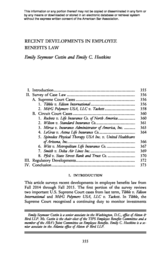International Trade & Regulatory Advisory: Cuba Update: Latest Changes Signal Expansion of Business Opportunities - February 2, 2016
Alston & Bird
Description
If you would like to receive future International Trade & Regulatory Group Advisories electronically, please forward your contact
information to trade.advisory@alston.com. Be sure to put “subscribe” in the subject line.
If you have any questions or would like additional information, please contact your Alston & Bird attorney or any of the following:
Thomas Feddo
202.239.3521
thomas.feddo@alston.com
James Burnett
202.239.3364
james.burnett@alston.com
Jason M. Waite
202.239.3455
jason.waite@alston.com
Laura E. Sierra
202.239.3925
laura.sierra@alston.com
Kenneth G.
Weigel 202.239.3431 ken.weigel@alston.com Chunlian Yang 202.239.3490 lian.yang@alston.com Thomas E. Crocker 202.239.3318 thomas.crocker@alston.com Eric A. Shimp 202.239.3409 eric.shimp@alston.com Jon M.
Fee 202.239.3387 jon.fee@alston.com Uni Li 202.239.3236 +86.10.85927501 uni.li@alston.com WWW.ALSTON.COM © ALSTON & BIRD LLP 2016 ATLANTA: One Atlantic Center n 1201 West Peachtree Street n Atlanta, Georgia, USA, 30309-3424 n 404.881.7000 n Fax: 404.881.7777 BEIJING: Hanwei Plaza West Wing n Suite 21B2 n No. 7 Guanghua Road n Chaoyang District n Beijing, 100004 CN BRUSSELS: Level 20 Bastion Tower n Place du Champ de Mars n B-1050 Brussels, BE n +32 2 550 3700 n Fax: +32 2 550 3719 CHARLOTTE: Bank of America Plaza n 101 South Tryon Street n Suite 4000 n Charlotte, North Carolina, USA, 28280-4000 n 704.444.1000 n Fax: 704.444.1111 DALLAS: 2828 North Harwood Street n 18th Floor n Dallas, Texas, USA, 75201 n 214.922.3400 n Fax: 214.922.3899 LOS ANGELES: 333 South Hope Street n 16th Floor n Los Angeles, California, USA, 90071-3004 n 213.576.1000 n Fax: 213.576.1100 NEW YORK: 90 Park Avenue n 15th Floor n New York, New York, USA, 10016-1387 n 212.210.9400 n Fax: 212.210.9444 RESEARCH TRIANGLE: 4721 Emperor Blvd. n Suite 400 n Durham, North Carolina, USA, 27703-85802 n 919.862.2200 n Fax: 919.862.2260 SILICON VALLEY: 1950 University Avenue n 5th Floor n East Palo Alto, California, USA, 94303-2282 n 650.838.2000 n Fax: 650.838.2001 WASHINGTON, DC: The Atlantic Building n 950 F Street, NW n Washington, DC, USA, 20004-1404 n 202.239.3300 n Fax: 202.239.3333 4 .
Weigel 202.239.3431 ken.weigel@alston.com Chunlian Yang 202.239.3490 lian.yang@alston.com Thomas E. Crocker 202.239.3318 thomas.crocker@alston.com Eric A. Shimp 202.239.3409 eric.shimp@alston.com Jon M.
Fee 202.239.3387 jon.fee@alston.com Uni Li 202.239.3236 +86.10.85927501 uni.li@alston.com WWW.ALSTON.COM © ALSTON & BIRD LLP 2016 ATLANTA: One Atlantic Center n 1201 West Peachtree Street n Atlanta, Georgia, USA, 30309-3424 n 404.881.7000 n Fax: 404.881.7777 BEIJING: Hanwei Plaza West Wing n Suite 21B2 n No. 7 Guanghua Road n Chaoyang District n Beijing, 100004 CN BRUSSELS: Level 20 Bastion Tower n Place du Champ de Mars n B-1050 Brussels, BE n +32 2 550 3700 n Fax: +32 2 550 3719 CHARLOTTE: Bank of America Plaza n 101 South Tryon Street n Suite 4000 n Charlotte, North Carolina, USA, 28280-4000 n 704.444.1000 n Fax: 704.444.1111 DALLAS: 2828 North Harwood Street n 18th Floor n Dallas, Texas, USA, 75201 n 214.922.3400 n Fax: 214.922.3899 LOS ANGELES: 333 South Hope Street n 16th Floor n Los Angeles, California, USA, 90071-3004 n 213.576.1000 n Fax: 213.576.1100 NEW YORK: 90 Park Avenue n 15th Floor n New York, New York, USA, 10016-1387 n 212.210.9400 n Fax: 212.210.9444 RESEARCH TRIANGLE: 4721 Emperor Blvd. n Suite 400 n Durham, North Carolina, USA, 27703-85802 n 919.862.2200 n Fax: 919.862.2260 SILICON VALLEY: 1950 University Avenue n 5th Floor n East Palo Alto, California, USA, 94303-2282 n 650.838.2000 n Fax: 650.838.2001 WASHINGTON, DC: The Atlantic Building n 950 F Street, NW n Washington, DC, USA, 20004-1404 n 202.239.3300 n Fax: 202.239.3333 4 .









